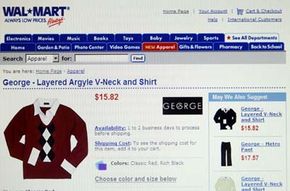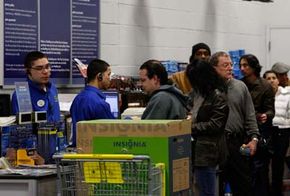When CompuServe created its Electronic Mall in the 1980s, few consumers had even dreamed of an online shopping environment. Now for many, it's become a way of life. Buying goods and services online saves time, offers greater selection, allows for independent research and often saves the consumer money.
It's hard to beat the Internet for convenience. A full 50 percent of adult Americans have broadband Internet access at home [source: Pew Internet & American Life Project]. This type of always-on, high-speed connection makes it simple to research and quickly buy goods and services. According to a 2008 survey by the Pew Internet & American Life Project, 78 percent of Internet users either agree or strongly agree that online shopping is "convenient," and 68 percent say that it "saves them time" [source: Pew Internet & American Life Project].
Let's look at airline tickets, for example. How did people buy airlines tickets before the Internet? If you knew the airline that flew to your desired destination, then you could call them, find out the schedule and prices, write it all down, and call them back when you were ready to purchase. If you didn't know which airline was the right one, then you'd have to call a travel agent, or go down to the travel agent's office and talk about different packages, rates and schedules.
Now, with the Internet, you can visit Web sites like Travelocity or Expedia. At those sites, you can compare rates and travel dates from multiple airlines. You can assemble hotel and rental car packages, reserve a tee time at the local golf course and pay for everything at the same time with your credit card. An impressive 64 percent of adult Internet users have bought or made a travel reservation online [source: Pew Internet & American Life Project].
The Internet is open 24/7. You can shop for shoes at midnight, rent a movie at breakfast and shop for travel deals when you really should be working. With e-commerce, normal time constraints are no longer an issue. You don't have to race from work to run six errands before the stores close. You can get your chores done while you're still at work and do the rest after putting the kids in bed.
And no store, no matter how huge, can match the Internet for variety and selection. Instead of being confined to stores in your immediate geographical area, you can shop from stores and Web sites located one state over or halfway around the world. You can buy from big national chains or small home businesses. With e-commerce, the consumer is in the driver's seat. If you put in the time, you can find the best deals on the widest variety of products and services in the world.
According to the Pew survey, 81 percent of Internet users have used the Web to research a product they're considering buying. In fact, 20 percent of Internet users say they research purchases on a daily basis [source: Pew Internet & American Life Project]. Once again, this gives consumers power that they never had before. In the past, you simply went to the store, looked at what they had, talked to a salesperson and bought what seemed like the best choice. Now you can read endless reviews by amateurs and professionals, compare prices from hundreds of vendors and even watch videos and interactive demos about the products you're considering.
Now let's look at some of the top advantages of e-commerce for doing business.




